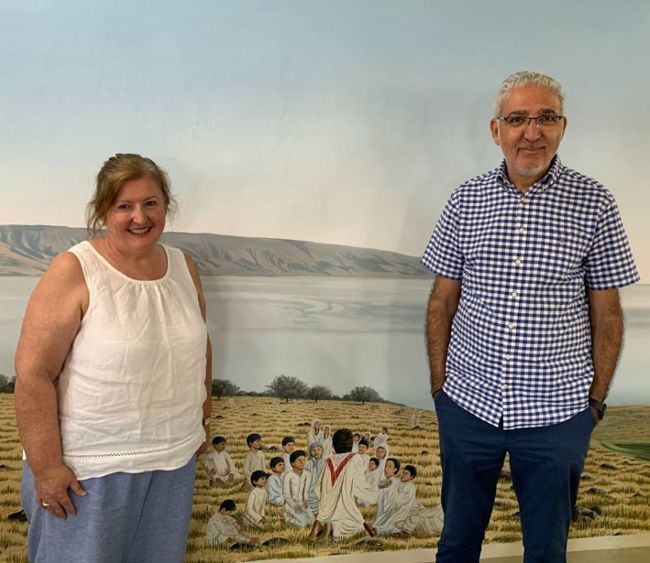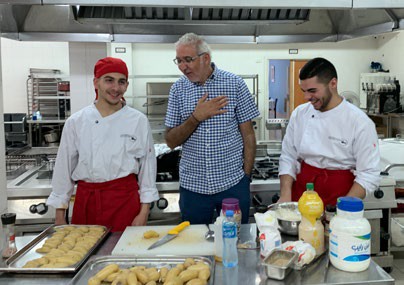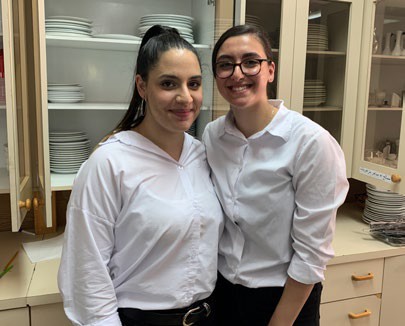Letter from the Holy Land
The Rev Dr Stewart Gillan reflects on the hope of presence.
GIOVANNI Anbar is so tall, you have to look up to him.
His welcome is warm and full of good humour, his enjoyment of a visit from Church of Scotland partners a bright and shining thing, in his office located in the lofty Altireh district of Ramallah, where the Samaria hills and Judean mountains meet – God’s hills as the translation of ‘Ramallah’ has it.
Together with his colleagues, Giovanni has taken the Episcopal Technological and Vocational Training Centre in Ramallah, which he has led since 2001, to high standing in the community and on the West Bank. They are standing tall for and with their students and community in the face of major challenges to their people and work, not least the physical, social and psychological impacts of occupation.
From a standing start, with local schools sending them their ‘worst’ students initially, the Centre has established a stunning reputation for excellence in personal formation and professional development in the hospitality and IT sectors. All students take basic courses in Arabic, English, maths, technology and religion. In the hospitality, courses cover cooking, service, housekeeping, reception, tourism, entrepreneurship and accounting. In IT students study physics, technical drawing and computer science. The student body is 50% Christian and 50% Muslim in a context where Christians make up 1% of the population. There is a waiting list to get in. And are there jobs for those who obtain their leaving certificate? 95% of their students are employed, with businesses referring staff for further training. The Centre offers vocational courses for adults as well.
You might think this too bright a picture. But I must tell you the first thing Giovanni said when the Rev Muriel Pearson and I sat down was: “We are about hope and the future.” Hope. It is one of those words you cannot say without saying something further: resilient hope, seasoned hope, or, as one community leader in Bethlehem has said, ‘hope in the hopelessness.’ When I asked Giovanni how he sustained his hope he replied: “What else do we have? Give up hope and we’re finished!” It is a reply we have been hearing all year. Palestinians are carrying on in hope, taking actions in hope, on both sides of the wall, in a most trying time. Giovanni is asking us to join him in hope by steering pilgrims to Ramallah as part of their visit to the land of the Holy One.
In the event, we met just six days before the historic decision taken in the Knesset (Israeli Parliament) on Monday July 24 2023 to grant final approval to an amendment that abolishes the Supreme Court of Israel’s power to overrule government decisions on the grounds of ‘reasonableness.’ This following 29 weeks of protest by hundreds of thousands of Israelis, including an historic march from Tel Aviv to Jerusalem on the eve of the decision, against the so-called ‘overhaul ‘of Israel’s judiciary. Seen as a ‘judicial coup’ by many Israelis, the overhaul is a project of those in the coalition government who think it undemocratic that government decisions be subject to review by an independent judiciary. In turn, they are seen to be threatening the very foundations of Israel’s democracy, risking Israel’s soul. Already petitions have been filed against the law, and High Court justices are preparing to deliberate. Can they freeze it, or invalidate it? By the time of publication we will know what happened next. Even so, it is important to mark the moment.
The word ‘unprecedented’ is being used both of the decision and of the size and resilience of Israeli protests against it, including the publicly voiced opposition of many Jewish organisations outside of Israel. Muriel and I, together with many internationals, have sought to take heart in the Israeli resistance movement, to see signs of hope in their stand for democracy and against far right extremism. All the while knowing that Palestinians have stayed out of it, and that their issues have gone unaddressed by it.
For if the ‘overhaul’ has been the political story of the year on one side of the wall, the occupation is the story of the year, of a lifetime, on the other. It is not in the least unprecedented that Palestinians continue to be targeted, harassed, and beaten down and the day-to-day obstacles placed in their way by the Israeli occupation of their territories.
In the face of this, the teeth of it, Palestinian partners, expressing little surprise that the law was approved, have been making their responses. Susan Rantisi Barhoum, a Palestinian Christian of the Episcopal Diocese of Jerusalem, posted her reply from Nazareth the morning after. Here is an excerpt, quoted with her permission, addressing the position from within Israel: “The bill passed its third and final reading with 64 votes in favour and 0 against, as the entire 56-member opposition boycotted the vote in protest. But is Israel a democracy? When it identifies itself as a Jewish State and continues to occupy, oppress and deny Palestinians their fundamental rights and freedoms just because they are Palestinian? More oppression in the future with no recourse. Lord, save us!”
Lord save us! ‘Hosanna!’ in other words. It is a cry that goes up weekly from the Lord’s Table in services all over the Land of the Holy One – St Andrew’s Jerusalem and Tiberias included. And so the question comes: what are we doing in the name of the Lord? Few in number and under increasing pressure, what are we prepared to do in spiritual and strategic partnership in Jesus’ name?
I find it increasingly difficult to write, preach, and lead prayers. To use words like peace and hope. To work in words at all.
The words that come seem not to answer. Perhaps that is my problem. I want them to answer. I need them to answer. I laugh at myself. I know that we are called to be the word, to embody the living Word of God as followers of Christ, empowered by his Spirit. Called as well to bring that word in all its compassion, justice and healing. A being and bringing that does not require that words be spoken. I know this, and yet …
In the face of atrocity words are not what come first. Presence comes first, and the words that come arise from presence. Perhaps we need to declare a moratorium on the spoken word, until our presence catches up. ¤
“
Palestinians are carrying on in hope, taking actions in hope, on both sides of the wall, in a most trying time."

Giovanni and students

Muriel and Giovanni

Students